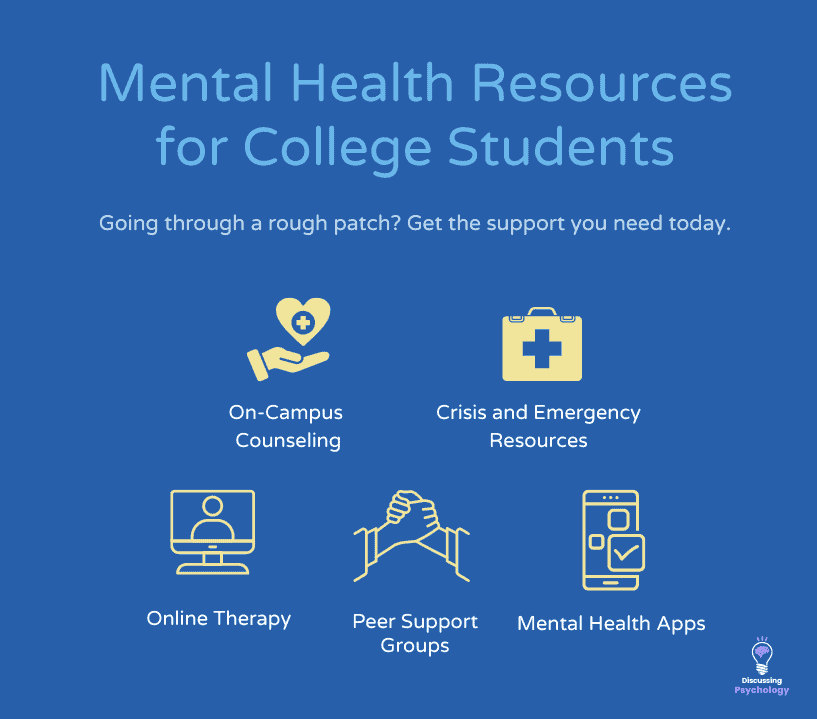Starting college brings many changes. Leaving home for the first time, moving to a new city, meeting new friends, and getting stuck into your studies can be exciting, but it can also be a difficult time for many.
Whether it’s the stress of essays and exams, juggling your studies and social life, or the worries and responsibilities of living away from home, it’s not uncommon to feel overwhelmed or isolated, and three in every five college students meet the criteria for a mental health diagnosis.
If you’re struggling with any part of college life, there’s plenty of help available.
Common Mental Health Challenges Among College Students
Anxiety
College brings its share of things to worry about, from your grades to fitting in with those around you. While some stress and worry are expected, anxiety can sometimes become pervasive and life-consuming.
Research shows that more than one in three students suffer from some form of anxiety disorder, meaning that anxiety has reached a severity that seriously impacts their enjoyment of life.
Alcohol Abuse/Binge Drinking
For many, wild nights and hungover mornings might be a big part of the college experience. Still, it’s essential to understand the difference between a good time and a potentially dangerous habit.
A few drinks with friends is one thing, but going too far can put you in unsafe situations and have serious long-term health repercussions.
You won’t be surprised to learn that 80% of students enjoy alcohol regularly and around half binge drink. Even if you don’t think your drinking is excessive, it might be unhealthy in other ways.
For some, booze is an escape from stress and worry; for others, it’s driven by peer pressure and spirals out of control. With a drinking culture all around you, it can be hard to say no.
Eating Disorders
Eating disorders such as anorexia and bulimia are pervasive in young adults, especially college students, for whom body image can be a big deal.
Whether it’s pressure to stay in shape to get a spot on the college football team, or the need to look your best and fit in, college makes many people very concerned about how they look and eat, which can bring on unhealthy eating habits.
For others, college pressures, time demands, and minimal experience in fending for themselves may lead to poor diets and bad eating choices.
Depression
Depression affects millions worldwide, and students are no exception, with 44% of students experiencing symptoms of a depressive disorder, according to one study.
Depression is more than just feeling sad. Other symptoms include a loss of enjoyment in leisure activities, sleep and eating habits disturbances, hopelessness and apathy, and even recurring thoughts about death and suicide.
It can be brought on by significant life changes, such as moving to college, or by the stresses of exams and social pressure, or simply having no one to talk to and feeling isolated.
Insomnia
Doing well in class, having a social life, and getting enough sleep are essential for healthy functioning. Many students feel they must pick one from this list and ignore the others because there isn’t enough time in the day.
When partying into the early hours and making early starts for lectures is the norm, it’s no wonder many students have an appalling sleep schedule.
And while some are lucky, few might be able to run on just a few hours a night; for most of us, ongoing sleep disturbances can take their toll on our mood and productivity.
Post-Traumatic Stress Disorder
College may mean leaving home and starting life somewhere new, but for some students, it means escaping from challenging situations and bringing the mental (or physical) scars with them.
Post-traumatic stress disorder (PTSD) occurs when traumatic events leave a lasting mark. You may experience flashbacks and extreme anxiety around what happened and feel unable to move on and live a normal life.
At college, this could be due to the lasting impact of events before you arrived. However, unfortunately, colleges aren’t exempt from crime and violence, so there’s always the possibility of experiencing trauma during your time as a student.
Self-harm
Many ways of responding to stress and hardship exist, but not all are helpful. For some young people, the urge to self-harm becomes a dangerous compulsion.
Self-harm isn’t necessarily about trying to end one’s life; for some, it’s a response to intense emotions such as sadness and anger. On the flip side, self-harm is sometimes used as a form of stimulation to combat overwhelming feelings of numbness.
Social Anxiety
For most people, starting college means leaving your established friendship groups and forming new ones.
On top of that, you have the pressure to navigate and find your place in the groups, cliques, and social circles that make up life on campus. Many students feel they are under constant scrutiny and worry about what others may think of them.
Social anxiety disorder represents the extreme end of this spectrum, where your worries about how you are perceived begin to impact your well-being and daily life severely. For some students, stepping out of their dorm room becomes a huge struggle.
Stress & Performance Anxiety
Stress is a normal part of life for most human beings. The looming pressure of exams and deadlines can make stress a constant companion for students.
Also, many students struggle with the more significant questions of what they want their life to be once they graduate.
A bit of stress during exam season is fine, but letting your stress levels build up and remain high for too long can seriously affect your physical and mental health. Poor lifestyle choices like excessive drinking and lack of sleep can exacerbate the issue.
Substance Use & Addiction
Alcohol isn’t the only substance you may be exposed to at college. For some, drugs such as marijuana, MDMA, and hallucinogens are just another part of a fun night out.
One study found that at least half of all students had experimented with drugs during college and fulfilled the criteria for a substance use disorder.
While self-discovery and exploring new things are natural parts of college, it’s important to understand the risks involved when putting any substance into your body.
Unfortunately, pressure from fellow students and drugs is simply “part of the culture,” meaning some people take them without knowing what they’re getting into.
Suicide
A recent study found that 15% of students in the 2021-2022 academic year had seriously considered suicide, the highest percentage on record.
There are many reasons a student might think about taking their own life: bullying, harassment, unmanageable stress, pressure to succeed, or simply being isolated and seeing no other way out of your situation.
Crisis and Emergency Resources
We all have moments where we feel overwhelmed and can’t see a way out.
If your situation has reached a crisis point and you don’t know where to turn for help, consider contacting one of the services below.
Often, opening up to someone about what you’re going through can take a weight off your chest. The trained listeners on the other end of these helplines can also signpost you to the best form of support in your area.
- ULifeLine
- National Suicide Prevention Hotline
- National Alliance on Mental Illness Helpline
- Crisis TextLine
- Substance Abuse and Mental Health Services Administration Line
Mental Health Support Available on College Campuses
CAPS – Counseling & Psychological Services
If you’re finding it hard to adjust to life as a student or any aspect of life on campus, your first step should be finding out what support your university offers.
Most colleges and universities have some kind of student support service where you can get help with the challenges of student life. Some universities have qualified counselors and therapists to work with students.
They’ll be able to signpost you to the different forms of support available. You can find out what’s available from a quick online search of your college site.
Looking after your well-being is part of any good college, so don’t be afraid to lean on these resources if needed.

Peer Support
With mental health concerns among students continuing to rise and some professional services stretched to capacity, students themselves are stepping up to meet the gap.
Many universities now have student-run peer support services. These can vary from informal meetups to online forums and practical support with adjusting to student life. Some even offer mental health awareness courses run by trained students.
These peer-to-peer services are excellent for connecting you with others who know what you’re going through and helping you understand and talk more clearly about your mental health.
However, remember that fellow students aren’t qualified therapists (even if they’re majoring in psychology!), so their advice and guidance shouldn’t be treated as sacred.
Incident Reporting
Severe incidents like theft, harassment, or violence should always be reported. You have a right to feel safe at college, and the university will most often take incidents like these seriously.
All universities have security and student well-being services that can help with things like bullying or antisocial behavior.
Some more prominent colleges have a police department to deal with more severe issues. Check your university’s website for the correct numbers to call, and keep them handy.
As always, if there’s a crime happening or you’re at all concerned for your safety, dial 911.
Off-Campus Mental Health Options
As a student, you’ll have access to whatever services and support your college offers. But the resources available to the general public are also open to you, and there are many great online and in-person options available in most locations.
In-Person Therapy
If mental health challenges like anxiety, depression, or unmanageable stress are taking all the joy out of your student life, therapy is always an option you can consider.
Working with a qualified therapist is a fantastic way to understand your mental health better and learn ways to cope with stress and negative thoughts.
There are many different kinds of therapy, so do your research on which you think suits you, and be sure to go with a licensed therapist who uses evidence-based techniques.
The support services at your university may be able to help, or you can use a directory like PsychologyToday to find therapists in your area.
Face-to-face therapy isn’t cheap and requires time and investment to see results, so make sure you understand the commitment before signing up.
If you have insurance, you can find therapists who accept it using a directory like Headway or Alma. You might also be covered under your parent’s health insurance policy, so it’s worth checking.
Support Groups
There are plenty of other options for support groups outside of those run by students.
You might prefer to join an online or in-person group outside your immediate peer circle and talk to people with a broader range of life experiences.
There are options for people struggling with specific issues, such as addiction or loneliness.
- Find Support Groups for Mental Health
- National Alliance on Mental Illness Support Group
- Alcoholics Anonymous
- The Dinner Party
- Hey Peers
Free Online Chat Rooms for Mental Health Support
There is no shortage of places you can talk about mental health online. If you want to speak with a trained listener and get some of your thoughts and worries off your chest, the links below can help.
Online Therapy Options for Students
Online therapy is an excellent option for students who can’t access the in-person kind due to location, time constraints, or other practical limitations.
Online therapy works exactly like face-to-face therapy: you’ll be matched with a therapist based on your situation and preferences and meet them for regular phone or video call sessions.
Online Therapy Providers that Accept Insurance
Online therapy is usually much cheaper than the in-person option but is still outside the price range of many students. Some providers accept insurance, so if you have coverage, you should take advantage of it.
Online therapy focusing on inclusivity and QTBIPOC support
Minority groups can be especially at risk of isolation and other challenges at college.
However you choose to identify, it can be helpful to talk to a therapist who has experience with people like you and understands the unique challenges you may face.
Online Psychiatric Support
Psychiatrists are like therapists because they are experts in diagnosing and treating mental health conditions.
They approach mental health from more of a medical perspective, so they can help with things like getting an official diagnosis and prescribing or advising on different forms of medication.
You can contact qualified psychiatrists through your doctor or the links below.
Meditation, Sleep, and Therapy Apps
Suppose you’re willing to put in some work yourself; many apps can help you manage your mental health. Apps can teach you about mental health concepts in an easily digested format and offer resources such as daily guided meditations and sleep aides.
There’s no shortage of apps, but some are better than others. Use this list as a starting point, and research before signing up for anything.
Productivity apps and tools
Apps and computer programs can also help with productivity and keep you on track during busy times.
Use these apps to stay organized and on top of your work priorities, taking some of the stress out of your studies.
Practicing Assertiveness
Although it’s important to approach social settings with an open mind, you should also aim to stay true to yourself and your values.
If other people’s expectations are making you feel uncomfortable, it’s best to speak up and assert your boundaries. The below resource is a fantastic guide on practicing assertiveness for college students.
Mental Health Tips for Students
Finally, you can do plenty to manage your mental health yourself. Here are a few quick-fire tips and good habits you can build into your daily life to bolster your resilience.
Don’t be afraid to ask for help
It’s often tempting to keep it to yourself when you’re struggling with stress or worry. You might worry about being a burden to others or about how those around you will take your concerns.
You are not alone in having your share of worries and concerns; opening up is the first step to taking them out of the darkness and doing something about them. Not only that but speaking openly might give other people the confidence to do likewise.
Stay social
Worries and negative thoughts thrive in isolation. The more you plug yourself into communities and groups of like-minded people, the less space in your brain for the unhealthy stuff.
You don’t want to fall in with the wrong crowds or use partying as an escape from reality, but keeping busy, having fun, and developing positive relationships are great ways to counteract the stress of student life.
Stay active
College is the perfect time for staying active and trying new things. The sheer variety of clubs, fraternities, and events on a typical campus is staggering, and throwing yourself into these activities can do wonders for your mood.
Whether you’re into sports, music, drama, gaming, or professional knife juggling, there will be others on campus with the same passions. It’s harder to feel stressed or isolated with a calendar full of fun events, so make the most of the opportunity college presents.
Get your 8 hours
While we advocate having fun and getting stuck into college life, getting enough sleep is vital too. A solid night of rest does wonders for your mood, physical health, and ability to cope with stress and worry. A decent sleep routine also helps with memory and learning, making your studies more manageable.
Go easy on yourself
While at college, your studies can seem like the be-all and end-all. But the reality is that there’s more to life than good grades. It’s essential to work hard, sure, but don’t beat yourself up or get too focused on being perfect that you’re unable to enjoy your time at college.
Perfectionism leads to unhappiness and burnout. Studying to the exclusion of other aspects of your life and until the last minute adds to the stress. Try to strike a good balance. Allocate time in your week for work, rest, and play.
Summary
College can be fun, rewarding, and an unforgettable time of your life. Everyone finds it hard sooner or later, but you don’t need to suffer in silence or carry the stress alone. Make good use of the resources available to you, and never be afraid to ask for help when needed.
- Abrams, Zara. (2022). Student mental health is in crisis: Campuses are rethinking their approach. American Psychological Association. https://www.apa.org/monitor/2022/10/mental-health-campus-care#:~:text=During%20the%202020%E2%80%932021%20school,306%2C%202022
- Alma. (2023). A simple, supportive approach to mental health care. https://helloalma.com/
- Galbicsek, Carol. (2023, May 12). College alcoholism. Alcohol Rehab Guide. https://www.alcoholrehabguide.org/resources/college-alcohol-abuse/
- Greenberg, Susan H. (2022, Nov. 3). Peer mental health programs are popular but raise concerns. Inside Higher Ed. https://www.insidehighered.com/quicktakes/2022/11/04/peer-mental-health-programs-are-popular-raise-concerns
- Headway. (2023). Let us find you a mental health provider. https://headway.co/
- Mosel, Stacy. (2023, March 20). Substance abuse in college students: Statistics and rehab treatment. American Addiction Centers. https://americanaddictioncenters.org/rehab-guide/college
- Nutt, Amy Ellis. (2018, June 28). College students are forming mental health clubs—And they’re making a difference. Washington Post. https://www.washingtonpost.com/news/to-your-health/wp/2018/06/28/college-students-are-forming-mental-health-clubs-and-theyre-making-a-difference/
- Pacheco, Danielle. (2023, Apr. 28). Memory and sleep. Sleep Foundation. https://www.sleepfoundation.org/how-sleep-works/memory-and-sleep
- Psychology Today. (2023). Find a therapist. https://www.psychologytoday.com/us/therapists
- Shine, K. N. (2023, March 9). College students’ anxiety, depression higher than ever, but so are efforts to receive care. University of Michigan News. https://news.umich.edu/college-students-anxiety-depression-higher-than-ever-but-so-are-efforts-to-receive-care
- Upson, Marisa. (2023, March 8). Understanding self-harm in college students. Best Colleges. https://www.bestcolleges.com/resources/self-harm/

